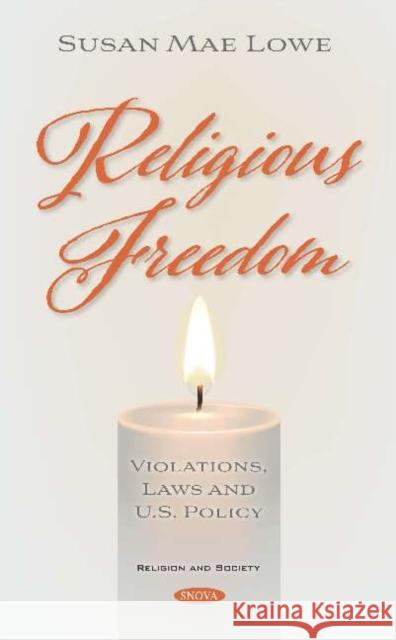Religious Freedom: Violations, Laws and U.S. Policy » książka
Religious Freedom: Violations, Laws and U.S. Policy
ISBN-13: 9781536172140
Religious freedom is a cherished American value, universal human right, and a Trump administration foreign policy priority. As reported in chapter 1, the State Department has designated Tajikistan, Turkmenistan, and Uzbekistan as Countries of Particular Concern (CPC) under the International Religious Freedom Act for engaging in or tolerating systematic, ongoing and egregious violations of religious freedom. The other countries so designated are Eritrea, Sudan, Iran, Saudi Arabia, Burma, China, and Vietnam. In India's Freedom of Religion Acts or "anti-conversion" laws are state-level statutes that have been enacted to regulate religious conversions. All of the laws seek to prevent any person from converting or attempting to convert, either directly or otherwise, another person through "forcible" or "fraudulent" means, or by "allurement" or "inducement." Despite criticism of India's anti-conversion laws, some human rights bodies have acknowledged that these laws have resulted in few arrests and no convictions. However, some observers note that the laws create a hostile, and on occasion violent, environment for religious minority communities because they do not require any evidence to support accusations of wrongdoing as discussed in chapter 2. Chapter 3 provides an overview of religious freedom issues in India, beginning with a brief review of U.S.-India relations and India's human rights setting broadly, then discussing the country's religious demographics, religious freedom protections, and conceptions of Hindu nationalism and its key institutional proponents in Indian society. Indonesia is the world's most populous Muslim-majority country, and it has long been known for its moderate interpretations of Islam. Yet, in recent years, there have been numerous acts of religious intolerance directed against minority religious groups in the country, including Ahmadis, a Muslim sect as reported in chapter 4. United States Commission on International Religious Freedom began reporting on China in the very first annual report, and has continued to do so every year since, because of that country's systematic, ongoing, egregious violations of religious freedom. As discussed in chapter 5, President Xi Jinping has personally launched efforts to sinicize religion, and the Central Government has issued commands to each Provincial Party Secretary making them responsible to bring religion in line with Communist Party ideology. Chapter 6 examines the right to hold different theological and different ethical and moral positions, even when they go against the prevailing spirit of our age. So long as these views are held and advanced peacefully and do not advocate physical violence that would violate human dignity. Chapter 7 is a copy of the Combating European Anti-Semitism Act of 2017. Chapters 8-12 discuss Supreme Court cases and decisions pertaining to religious freedom.











